If you are planning to start a business or are currently running a small business, then the Best Digital Marketing Tools for Small Businesses are something to consider. Still, they’re a necessity as these tools will help you automate the business process, saving you time and also the cost of employing someone to do such a task. With the rise of e-commerce, social media marketing, mobile browsing, and remote business models, small businesses need powerful yet affordable tools to stay relevant, visible, and profitable.
Here are some of our popular post: Top 10 best website builders, Best super foods for a healthy lifestyle, the unlimited list of free productivity apps, Best freelance site to find remote jobs, top 10 productivity hacks for entrepreneurs, 10 best side hustles to make extra money online, best online courses for learning digital skills, top 10 best free coding website
Whether you’re a small entrepreneur managing everything yourself or a small team juggling multiple roles, this comprehensive guide will walk you through the best digital tools to help you automate tasks, grow your audience, improve customer engagement, and ultimately increase your revenue in 2025.
Running a small business without leveraging digital marketing is like hosting a grand opening with no signage or invites. It doesn’t matter how good your product or service is—without visibility, customers won’t find you.
In 2025, consumer behavior has shifted almost entirely online. From product research to purchase decisions, everything happens digitally. This means small businesses must invest in digital marketing not just to grow, but to survive. Yet, many face three key challenges: limited staff, small budgets, and a lack of time or technical know-how.
Thankfully, the best digital marketing tools for small businesses are designed to bridge this gap. They’re affordable, user-friendly, and powerful. With the right tool stack, even a one-person business can compete against bigger brands, automate time-consuming tasks, and scale faster than ever.
What Are Digital Marketing Tools?
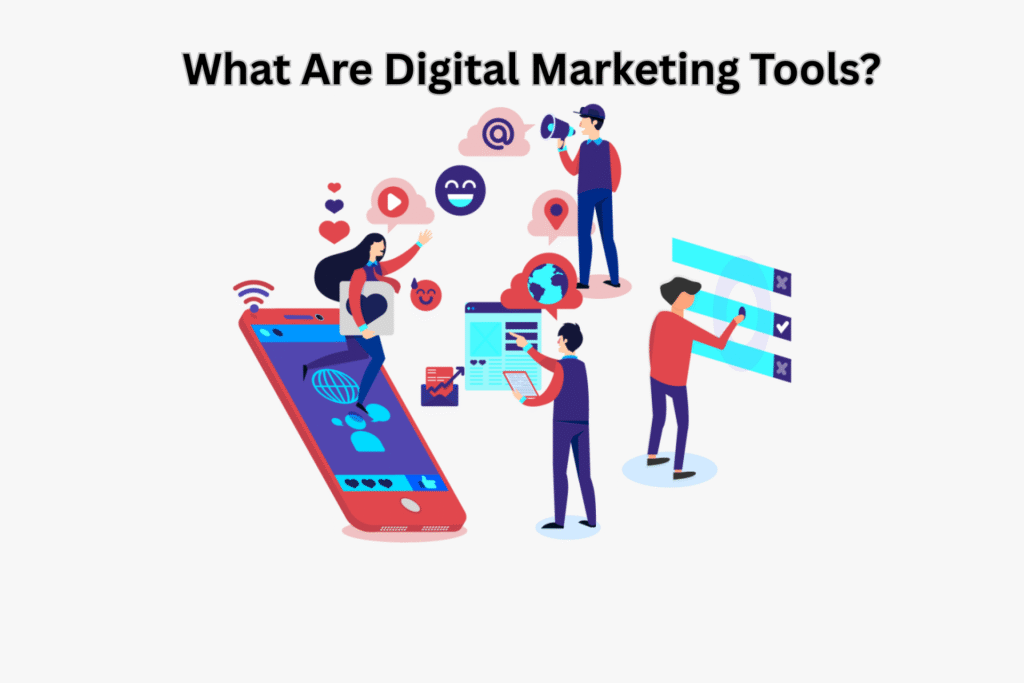
Digital marketing tools are simply software or apps that help you do all kinds of marketing tasks online, like creating content, scheduling social media posts, sending email newsletters, optimizing your website for Google, tracking how your visitors behave, and even following up with leads. Whether you’re a one-person business or part of a small team, these tools make life easier by saving time and improving your results.
Imagine trying to run a small business in today’s world without being online. It’s nearly impossible. From attracting customers to building relationships and making sales, everything now happens on digital platforms. That’s where digital marketing tools come in—they’re like your online business assistants, helping you manage, automate, and measure your marketing efforts across the internet.
Think about when you post on Instagram, run ads on Facebook, or send out an email blast to your customers. Instead of doing each of these things manually, some tools help you plan, automate, and track everything in one place. That’s a digital marketing tool at work. For example, instead of logging into every social platform one by one, a tool can let you schedule all your posts for the week from a single dashboard. Instead of wondering what keywords to use in your blog post, another tool can tell you what people are searching for online.
There are different types of tools depending on what you need. Some help you design graphics or videos, others help you write blog content, track visitor behavior, manage email campaigns, or even build your website without any coding skills. And there are also all-in-one platforms that combine everything, so you don’t have to juggle ten different apps.
What makes these tools so valuable for small businesses is that they give you professional-level capabilities without needing a huge budget or a full marketing team. You can automate your emails, monitor your website traffic, post consistently on social media, and even follow up with customers—all while focusing on actually running your business.
Why Digital Marketing Tools Matter for Small Businesses
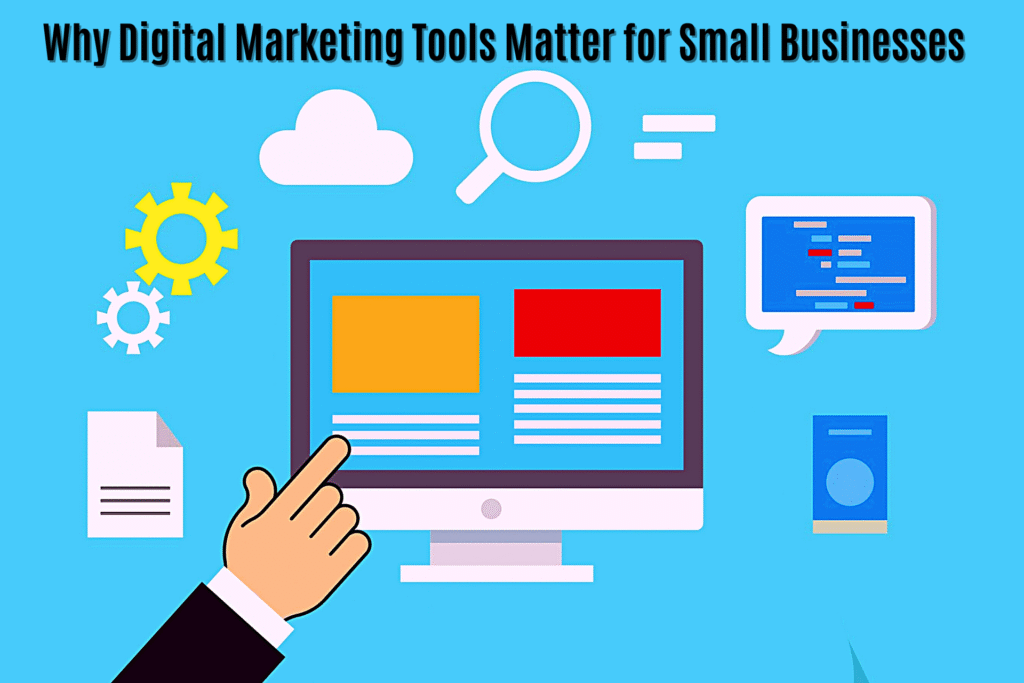
#1. They Save You Time and Energy: Digital marketing tools automate your repetitive tasks—whether it’s posting on social media, sending out email newsletters, or responding to common customer inquiries. This means you can focus more on growing your business rather than getting bogged down by daily to-do lists.
#2. They Maximize Your Small Budget: You don’t need a massive marketing budget to compete anymore. With the right tools, even a small business can launch campaigns, run social ads, and track performance in real time—without spending a fortune. Many platforms even offer free plans or affordable pricing tiers that scale with your needs.
#3. They Help You Reach More People, Faster: From email blasts to scheduled social media posts, digital tools help you expand your reach across multiple channels. With just a few clicks, your message can reach thousands of potential customers, whether they’re scrolling through Instagram or checking their inbox.
#4. They Improve Your Targeting and Personalization: With advanced tracking and segmentation features, these tools allow you to send the right message to the right person at the right time. You can personalize offers based on behavior, interests, or previous purchases, creating a more meaningful connection with your audience.
#5. They Provide Real-Time Data and Insights: Guesswork has no place in modern marketing. Analytics tools give you immediate feedback on what’s working and what’s not. You’ll know which social posts drive engagement, which emails get opened, and where your website visitors are coming from, allowing you to adjust your strategy instantly.
#6. They Boost Visibility on Search Engines and Social Platforms: SEO tools, keyword trackers, and content planners help your business rank higher on Google and stay active on platforms like Facebook, TikTok, or LinkedIn. This translates to more organic traffic, better brand awareness, and increased trust among customers.
#7. They Build Stronger Customer Relationships: CRM tools let you track every interaction with a lead or customer, from the first click to the final sale. This helps you respond more personally, send tailored follow-ups, and maintain long-term relationships that go beyond one-time transactions.
#8. They Scale With Your Business: As your business grows, so do your marketing needs. Fortunately, most digital marketing tools are scalable. Whether you’re managing 10 customers or 10,000, the same tools can adapt to handle more traffic, more contacts, and more campaigns—without skipping a beat.
#9. They Empower You to Compete With Big Brands: In the past, small businesses were often overshadowed by large corporations with massive marketing budgets. Today, digital tools level the playing field. You can build sleek websites, create compelling campaigns, and track customer behavior just like the big guys, without the big spend.
#10. They Offer Peace of Mind Through Consistency: Consistency is one of the hardest parts of marketing. With automated workflows, pre-scheduled content, and data-backed decisions, you can maintain a steady online presence without constantly being online yourself. It’s like putting your marketing on autopilot—reliable, consistent, and effective.
Core Categories of Small Business Marketing Tools
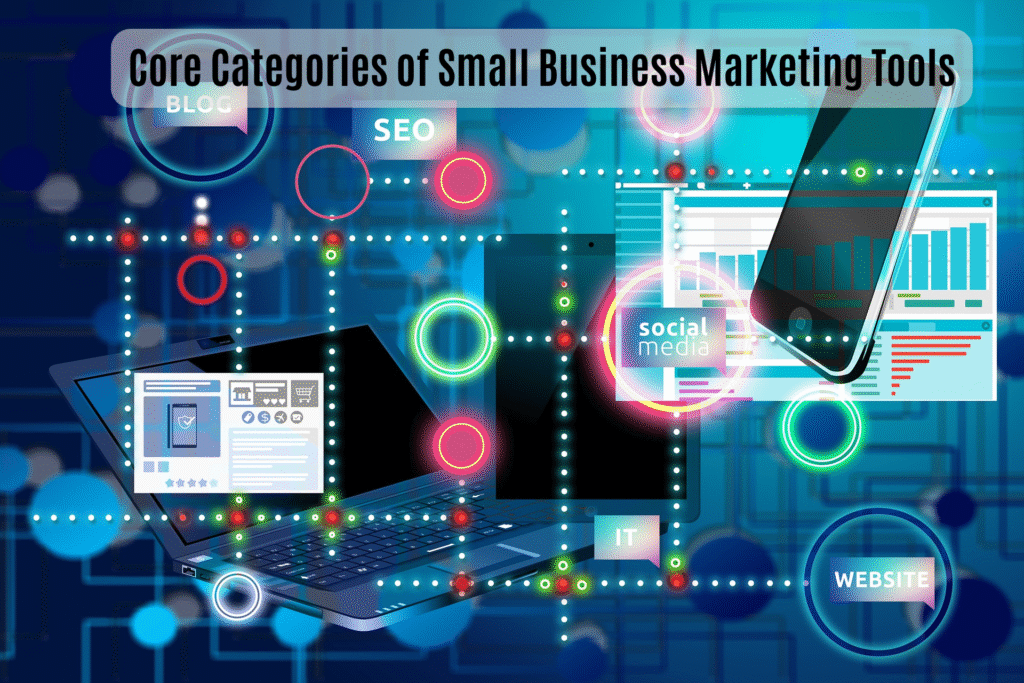
To stay competitive and grow in the digital age, small businesses must leverage the right mix of tools. These tools are not just “nice to have”—they form the backbone of an efficient, results-driven marketing strategy. From building your online presence to managing customer relationships and creating content, each category of digital marketing tools serves a unique and critical purpose. Let’s explore the essential categories every small business should consider when choosing the best digital marketing tools for small businesses.
#1. Website & Landing Page Builders: Your website is your online storefront—it’s often the first impression a potential customer has of your brand. Website and landing page builders make it easy for non-tech-savvy entrepreneurs to create professional, responsive, and SEO-friendly pages without writing a single line of code. These tools usually come with drag-and-drop editors, customizable templates, mobile optimization, and integrations with email marketing and analytics platforms. Whether you’re setting up a simple informational site, a blog, or a full ecommerce store, platforms like WordPress, Wix, or Leadpages make the process fast, affordable, and scalable.
#2. SEO Tools for Small Business: Search Engine Optimization (SEO) is the secret sauce behind organic traffic. Without it, even the best-looking website might remain invisible on search engines. SEO tools help you identify high-ranking keywords, audit your website’s performance, monitor backlinks, and analyze competitor strategies. For small businesses, these tools level the playing field, allowing them to rank alongside—or even above—larger competitors. Tools like Ubersuggest, Ahrefs, and Google Search Console give you the insights you need to optimize your website content, fix technical issues, and increase your visibility where it matters most: search engine results pages.
#3. Email Marketing Tools: Email marketing remains one of the most cost-effective ways to connect with your audience. It allows you to build long-term relationships, drive repeat business, and communicate directly with people who’ve shown interest in your brand. Modern email marketing tools help you collect emails, segment audiences, automate welcome sequences, and send beautifully designed newsletters. Many platforms offer advanced analytics to track open rates, click-throughs, and conversions. For small businesses, tools like Mailchimp, Brevo, or MailerLite make it easy to maintain consistent communication without needing a dedicated marketing team.
#4. Social Media Tools: Managing multiple social media accounts manually can quickly become overwhelming. Social media tools streamline this process by allowing you to schedule posts in advance, respond to comments and messages from a single dashboard, and analyze engagement metrics. They help you stay consistent, save time, and interact with your audience in real-time. Tools like Buffer, Later, and SocialBee are especially useful for small businesses looking to build their brand across platforms like Instagram, Facebook, Twitter, and TikTok—without having to be online all day.
#5. Graphic Design Software: Visual content is king in the digital world. From eye-catching Instagram posts to promotional flyers and product mockups, great design makes your brand stand out. The best part? You don’t need to hire a professional designer to create stunning visuals. User-friendly graphic design tools like Canva, VistaCreate, and Adobe Express come with pre-designed templates that are customizable and optimized for various platforms. These tools empower small business owners to create professional-grade designs that maintain brand consistency and engage customers visually.
#6. CRM & Sales Funnels: Customer Relationship Management (CRM) tools are essential for organizing and nurturing your leads. They store detailed customer data, track interactions, and automate follow-ups to help you close more sales with less effort. Sales funnel tools take it a step further by guiding prospects through a structured journey—from awareness to conversion. Whether you’re offering services, selling products, or managing clients, platforms like HubSpot, GoHighLevel, and Zoho CRM help small businesses stay organized, improve communication, and automate repetitive sales tasks.
#7. Analytics & Reporting Tools: Without data, you’re flying blind. Analytics tools show you what’s working in your marketing strategy and what needs improvement. From tracking website traffic and user behavior to measuring social engagement and email performance, these tools provide the insights necessary for smart decision-making. Google Analytics 4, Hotjar, and Fathom Analytics offer powerful features for monitoring performance, identifying bottlenecks, and optimizing campaigns. Small businesses benefit from the clarity these tools provide, allowing for more confident, data-backed marketing decisions.
#8. AI Content Generators: Creating content consistently can be exhausting, especially when you’re juggling multiple tasks. AI-powered content tools make this process faster and easier. Whether you need help writing blog posts, generating product descriptions, drafting social captions, or brainstorming email copy, AI tools like ChatGPT, Jasper, and Copy.ai can assist with creative and technical writing. These tools help small businesses scale their content production while saving time and maintaining a consistent brand voice across platforms.
#9. All-in-One Marketing Platforms: For entrepreneurs who prefer having everything in one place, all-in-one platforms offer tremendous value. These tools combine multiple functions—like landing pages, email marketing, sales funnels, and CRM—into a single dashboard. They’re especially beneficial for solopreneurs and small teams that want to simplify their tech stack and avoid juggling multiple subscriptions. Systeme.io, GetResponse, and Builderall are popular choices that give you powerful marketing capabilities in one streamlined solution. They allow small businesses to launch and manage full campaigns with ease, making them a top pick among the best digital marketing tools for small businesses.
The beauty of digital marketing software for SMEs is that these tools often integrate, giving you a seamless, efficient setup that runs much of your marketing on autopilot.
Things to Look for When Choosing the Best Digital Marketing Tools for Small Businesses
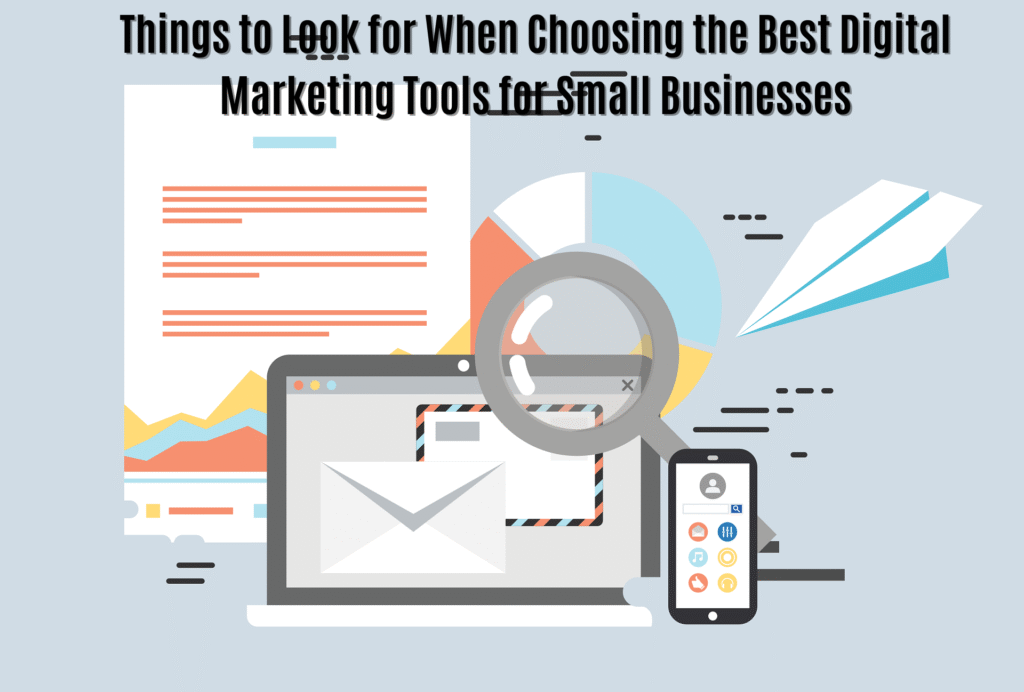
Choosing the best digital marketing tools for small businesses can feel overwhelming, especially when you’re juggling a tight budget, limited time, and the pressure to grow. To make smart, impactful decisions, keep your focus on these ten key considerations:
#1. Know Your Budget First: Before getting distracted by shiny features or paid plans, look at what you can realistically afford. Many powerful tools offer free or freemium versions, which are perfect for small businesses just getting started. Begin there and only invest in upgrades when you’ve outgrown the basics.
#2. Align Tools with Your Business Goals: Your goals should guide your tool choices. Want more leads? Go for a good CRM and email marketing tool. Need more visibility? Prioritize SEO platforms and social media schedulers. The best tools solve the most urgent problems in your business.
#3. Evaluate Ease of Use: A tool is only effective if you can use it. If a platform looks too complex or requires a steep learning curve, it might waste more time than it saves. Choose tools that have intuitive dashboards, helpful tutorials, and don’t require technical expertise to operate.
#4. Check for Integration Capabilities: The best digital marketing tools for small businesses should easily connect with the tools you already use, like your website builder, ecommerce platform, or email service provider. Seamless integration saves time, reduces manual work, and improves efficiency.
#5. Start Small with 2–3 Core Tools: Avoid the common mistake of signing up for too many tools at once. Focus on two or three that directly support your biggest marketing priority. Master those, then expand your stack gradually as your business grows.
#6. Look for Strong Customer Support: No matter how user-friendly a tool is, you’ll run into questions. Prioritize platforms that offer responsive customer support, community forums, and onboarding resources. Good help can save you hours of trial and error.
#7. Prioritize Scalability: Choose tools that can grow with you. A platform that works for your current needs should also offer upgrades or advanced features for when your business scales. This prevents you from switching systems later, which can be time-consuming and disruptive.
#8. Consider Automation Features: Time is one of your most limited resources. Tools that automate tasks like social media posting, email follow-ups, lead scoring, or analytics reporting allow you to focus on what really matters—running your business.
#9. Pay Attention to Reporting and Insights: Marketing without tracking is like flying blind. The best digital marketing tools offer real-time data, clear reports, and actionable insights. Understanding what’s working and what’s not will help you make smarter decisions.
#10. Choose Tools Designed for Small Teams: Some platforms are built for large enterprises and require multiple users or departments to manage. Small businesses do best with tools that are tailored for solopreneurs or lean teams—tools that are lightweight, agile, and deliver big results with minimal effort.
Top 10 Best Digital Marketing Tools for Small Businesses in 2025
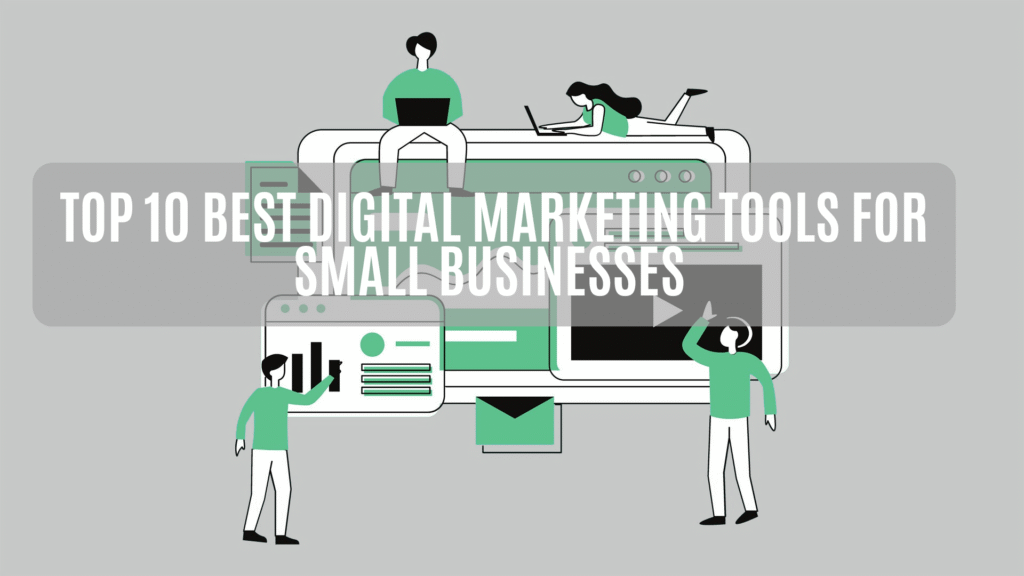
When it comes to choosing the best digital marketing tools for small businesses, it’s crucial to find platforms that are affordable, easy to use, and impactful. Here’s a deeper look at ten powerful tools that have earned their place in the digital toolbox of thousands of small business owners worldwide.
#1. Google Analytics 4 (GA4)
remains the gold standard for understanding website performance. It helps businesses track user activity, measure conversion rates, analyze traffic sources, and even forecast trends with AI-powered insights. Unlike its predecessor, Universal Analytics, GA4 uses an event-based model, giving a more granular view of customer behavior across websites and mobile apps. Since becoming the default in 2023, GA4 also emphasizes data privacy and compliance, making it suitable even for businesses navigating strict regulations like GDPR. For small businesses, it’s a game-changer—and the best part? It’s completely free, with advanced enterprise features available via Google Analytics 360.
#2. Mailchimp
has evolved from a simple email marketing tool into a full-blown marketing platform. It enables small business owners to design email campaigns, automate customer journeys, build landing pages, and segment audiences with ease. Founded in 2001 as a side project, Mailchimp has grown into a globally recognized brand, known for its playful design and practical capabilities. Since its acquisition by Intuit in 2021, the platform has integrated deeper financial and e-commerce tools, making it even more valuable for business owners looking to sync their marketing and sales efforts. Mailchimp offers a generous free plan for up to 500 contacts, with paid plans starting at $13 per month for more robust features.
#3. Canva
It is arguably the most beloved design tool for non-designers. Whether you’re creating social media posts, flyers, product brochures, or digital ads, Canva offers a drag-and-drop experience that feels effortless, even for total beginners. Launched in Australia in 2013, Canva quickly disrupted the traditional design space by making professional-quality visuals accessible to everyone. In recent years, it has introduced AI-powered design tools and content suggestions, speeding up the creative process for small teams. While the free version is rich with templates and tools, Canva Pro, priced at around $12.99 per month or $100 annually, unlocks brand kits, premium assets, and team collaboration features.
#4. SEMrush
It is a powerhouse for businesses looking to dominate in SEO, content marketing, and competitive analysis. It offers comprehensive keyword research, domain tracking, site audits, backlink monitoring, and advertising insights—all in one dashboard. Since its founding in 2008, SEMrush has become a trusted name among marketers aiming to improve organic rankings and online visibility. It’s particularly useful for small businesses that rely heavily on inbound traffic but lack the budget for full-time SEO experts. Though it’s one of the more expensive tools on this list—starting at $117.33 per month—it delivers unmatched depth for those serious about search engine marketing.
#5. Hootsuite
has been around since 2008 and continues to be a favorite among teams that manage multiple social media accounts. This platform helps businesses schedule posts, track engagement, and monitor brand mentions across platforms like Instagram, Facebook, Twitter, and LinkedIn. Its dashboard is designed for efficiency, allowing small teams to collaborate on content and manage customer messages from one place. For businesses that rely on social media for awareness and customer engagement, Hootsuite is an excellent option. Its pricing starts at $99 per month, and a free 30-day trial is available for users who want to explore its full range of features before committing.
#6. Ahrefs
It is widely respected for its deep insights into backlinks, keyword opportunities, and competitor strategies. It offers one of the largest link databases in the world, which makes it particularly valuable for businesses looking to improve their domain authority and uncover SEO gaps. Since launching in 2010, Ahrefs has earned a loyal following among marketers and webmasters alike. Its interface is sleek and data-rich, offering clarity for both novice users and seasoned SEO professionals. With plans starting at $99 per month, Ahrefs is an investment—but a worthwhile one for small businesses that want to punch above their weight in search rankings.
#7. Dumpling AI
It is a rising star in the marketing AI space, created specifically for small businesses that need help with strategy, planning, and content. It provides tailored content calendars, blog outlines, email campaign suggestions, and SEO recommendations, generated in seconds using advanced AI. What sets Dumpling AI apart is its human-like tone and practical marketing suggestions, making it feel like a virtual assistant rather than a robotic tool. Although it’s one of the newer entrants, its popularity is growing fast thanks to its accessible design and focus on small business workflows. Dumpling AI offers tiered pricing and a free trial, making it easy to explore before committing.
#8. Systeme.io
It is a complete all-in-one marketing platform perfect for entrepreneurs and lean teams. It allows users to build funnels, run email campaigns, host online courses, and automate marketing tasks—all from a single dashboard. Launched in 2018, Systeme.io quickly gained a reputation for simplifying the digital marketing stack and lowering the entry barrier for new business owners. Its pricing model is highly competitive, with a fully functional free plan and premium options starting at just $27 per month. For solopreneurs and growing startups, this tool offers exceptional value without the complexity of multiple software subscriptions.
#9. Buffer
It is a lightweight and intuitive social media management tool best known for its clean interface and ease of use. Ideal for solo entrepreneurs or small teams, Buffer supports post scheduling, link tracking, and performance analysis across various social networks. Since its founding in 2010, Buffer has also been recognized for its transparent business model and remote-first culture, which many small businesses admire and align with. A free plan makes it easy to get started, and paid plans are affordable, starting at only $6 per month per social media channel, making Buffer a great choice for budget-conscious marketers.
#10. Jasper AI,
formerly known as Jarvis, has revolutionized AI-assisted copywriting for small businesses. It helps you write high-quality blog posts, ad copy, emails, and product descriptions in minutes. Launched in 2021, Jasper quickly became one of the top-rated AI writing tools, known for its natural-sounding output and ease of use. It’s especially valuable for content marketers, bloggers, and ecommerce sellers who need consistent, conversion-focused messaging without the time sink of manual writing. Pricing begins at $49 per month, offering scalable packages for growing content needs.
Conclusion: The Best Digital Marketing Tools for Small Businesses
The rise of digital marketing software for SMEs has truly revolutionized the way small businesses operate. With the right tools in your corner, you don’t just market—you grow, connect, and compete. Whether you’re trying to generate leads, engage your audience, or improve conversions, these tools turn your business into a well-oiled, digitally empowered machine.
The best digital marketing tools for small businesses in 2025 are powerful, accessible, and designed to help you grow, even with limited time and budget. But don’t try to use every tool out there. Start small, focus on your biggest marketing need, and master a few tools before expanding.
Here are some of our popular post: Top 10 best website builders, Best super foods for a healthy lifestyle, the unlimited list of free productivity apps, Best freelance site to find remote jobs, top 10 productivity hacks for entrepreneurs, 10 best side hustles to make extra money online, best online courses for learning digital skills, top 10 best free coding website
In short, digital marketing tools are what help small businesses look big, act smart, and grow faster in a competitive digital world. They’re not just nice to have—they’re essential.
Avoid the “shiny object syndrome” of constantly switching platforms. Instead, choose tools that align with your business goals, are easy to learn, and offer a clear return on investment.
With consistency, creativity, and the right tech stack, your small business can punch far above its weight in today’s highly competitive marketing.


